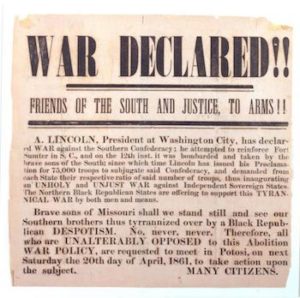
On this date, in 1861, the American Civil War began. This war is also referred to as "The War Between the States," "The War of Rebellion," or "The War for Southern Independence."
In February of that year, a newly elected Abraham Lincoln left his home in Springfield, Illinois, for the White House. Security measures were needed to ensure his safety when reaching Harrisburg, Pennsylvania. His inaugural address, delivered on March 4, was conciliatory in tone and was unpleasing to the South, though giving them hopes of a non-interference policy with the slavery issue. Lincoln's administration took the first real military action. Fort Sumter, in Charleston harbor, was under pressure from a Confederate force. Was it to be given up without a struggle? The answer to Lincoln's vital question was clear: evacuate the fort.
That month, a Union fleet sailed southward, acting on this purpose. As soon as this came to the knowledge of the leaders at Charleston, hostilities were stepped up. The South told the Union officer in charge (General Anderson) to evacuate the fort at once. On April 12, he offered to leave on the 15th if he did not receive government aid by that date. The Confederate General P. G. T. Beauregard gave him one hour to decide, or they would open fire on the fort. At twenty minutes past four A.M. that morning, the first mortar was fired from Sullivan's Island, announcing the Civil War had begun.
The war lasted until May 26, 1865, when the last Confederate army surrendered. The war took over 600,000 lives, destroyed property valued at 5 billion dollars, freed more than 4 million Black slaves, and opened emotional and philosophical wounds that have not yet completely healed.
The Encyclopedia Britannica, Fifteenth Edition.
Copyright 1996 Encyclopedia Britannica Inc.
ISBN 0-85229-633-0
The World Book Encyclopedia.
Copyright 1996, World Book, Inc.
ISBN 0-7166-0096-X